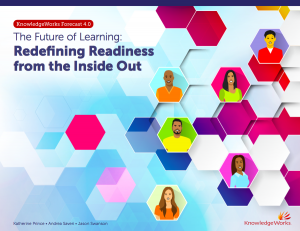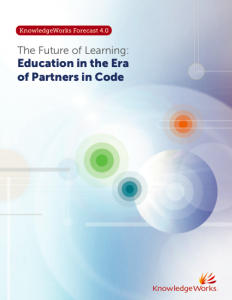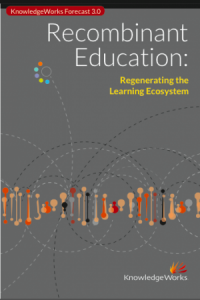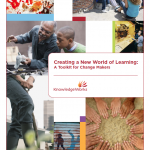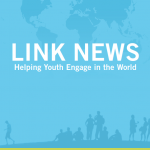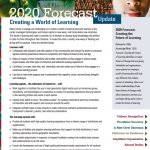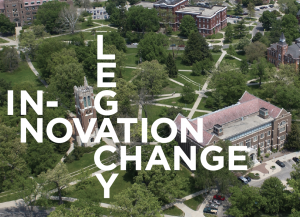Navigating the Future of Learning: Forecast 5.0
Education – as both a cultural value and a system – is critical social infrastructure that can bolster our capacity for adaptation and evolution. During this period of technological acceleration, climate change and escalating demands for social justice, education’s role in supporting the healthy development of young people, enabling effective lifelong learning and contributing to community vitality will be increasingly critical.
This forecast explores five drivers shaping the context for change and four provocations for exploring new possibilities for designing education systems, structures and practices. Download. Order printed copies.
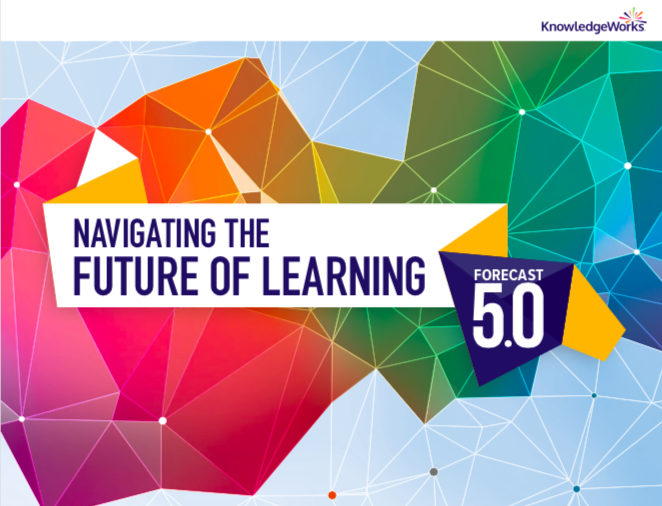
Redefining Readiness from the Inside Out
What will work look like in the fourth industrial revolution? What will it mean to be career-ready in 2040? How might schools re-align strategy and priorities for student success in the future?
Work is changing rapidly as we enter a new era fueled by exponential advances in digital technologies. In particular, the rise of smart machines and the decline of the full-time employee are reshaping the ways people work and are creating significant uncertainty about what readiness for further learning, career, and life will look like in 2040.
This report forecasts key characteristics of future work and proposes a framework for redefining readiness that is based on core social-emotional building blocks and foundational cognitive and metacognitive practices. This new foundation for readiness argues for an organizational structure and operating system for education that is rooted in, and focuses on, human feeling and relating. Guiding principles point to several opportunities for how K12 and Higher Education stakeholders might support learning and readiness in this new era.
Go here to order hard copies.
The Future of Learning: Education in the Era of Partners in Code
Over the next decade, our lives will become so inextricably linked with our digital companions that we will find ourselves living as partners in code, creating the next generation of human-digital co-evolution.
This forecast explores how five drivers of change intersect with three impact areas to create a new landscape of possibility for education. This is the fourth forecast of education that Saveri Consulting has created in partnership with The KnowledgeWorks Foundation.
Go here to order hardcopies.
Exploring the Future Education Workforce: New Roles for an Expanding Learning Ecosystem
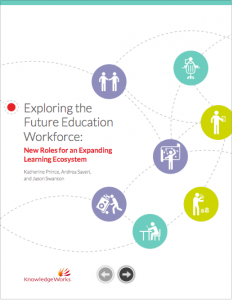
Education stakeholders cannot cultivate vibrant learning ecosystems that work well for all learners without thinking anew, not just about their structures and cultures, but also about the people working in them. Today, education stakeholders typically think of teachers as working for traditional schools, with teaching roles looking fairly similar from one school to the next. Administrator roles are somewhat more diverse but are also tied strongly to schools and school districts. As the learning ecosystem expands and diversifies over the next decade, educator roles must also diversify in order to provide critical linkages across settings and strengthen the webs of support surrounding learners.
This report explores seven new roles that offer possibilities for interconnecting vibrant learning ecosystems. future-ed-workforce-roles-learning-ecosystem
Cultivating Interconnections for Vibrant and Equitable Learning Ecosystems
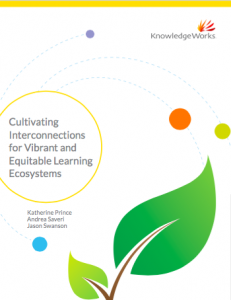
We have increasingly come to question whether the future of learning will be equitable. We see great potential to create flexible and radically personalized learning ecosystems that meet the needs of all learners and have the adaptability to keep evolving with our rapidly changing world. But we worry that education in the United States might be more likely to end up as a fractured landscape in which only those learners whose families have the time, money, and commitment to customize or supplement their learning journeys will have access to high-quality personalized learning that reflects their interests and meets their needs.
Given these profound concerns, this paper explores how education stakeholders might cultivate the connections necessary to make the expanding learning ecosystem vibrant for all learners.
Recombinant Education: Regenerating the Learning Ecosystem
Saveri Consulting created the third edition of the KnowledgeWorks Foundation’s education forecast, Forecast 3.0, Recombinant Education: Regenerating the Learning Ecosystem. See more on knowledgeworks.org.
Creating a New World of Learning: A Toolkit for Change Makers
Created in partnership with the KnowledgeWorks Foundation.
We will not benefit from the possibilities of a new world of learning or transform today’s public learning system without innovative thinking and action on the part of many people and organizations. We need to think and act differently than we have been. A Toolkit for Change Makers is designed to help you do just that.
First, it will help you explore a new world of learning that will be customized, connected, amplified, authentic, relevant, and resilient and consider new opportunities for learners and the learning system. Second, it will help you consider possibilities and plan for action in light of these opportunities and your organization’s particular vision and mission. To help you achieve these goals, the toolkit provides you with tools and materials to lead hands-on activities that will allow you and your group to play with ideas, experiment with possibilities, and create real actions.
Link News: Helping Youth Engage in the World
Created for Link TV
Several trends are intersecting to create an opportunity for better serving the youth audience with quality world news and information. Deep commercialization and consolidation of news media organizations have reduced the diversity and depth of news. Emerging technologies, devices, and applications have opened up new digital media ecologies for creating, sharing, and commenting on news by both professional journalists and citizens. Online sources for aggregating and searching news and information have made it possible to provide a broader set of perspectives on issues and combine different media formats, such as video, text, and audio. In addition, pressing societal issues such as climate change, social justice, economic instability, and globalization have linked local and global issues.
Young people are at the center of these intersecting trends. They are discovering and honing their abilities to connect to their communities and affect their worlds, yet the news and information they rely on can be difficult to trust, understand, and apply toward positive action. The opportunity to provide youth with a richer set of resources for learning about the world and the ways they can participate in it would contribute toward a more aware and informed youth population.
How do youth interact with news media? What tools can news organizations use to reach young people interested in learning more about the world they live in? LinkNews Report
2020 Forecast: Update
Creating a New World of Learning
Created in partnership with the KnowledgeWorks Foundation.
Major forces of change are challenging us to realize a world of learning that puts learners at the center, leverages technologies and human capital in new ways, and incorporates new structures. This world of learning will make it possible for all learners to develop deep knowledge and abilities in order to thrive throughout their lifetimes. To make this vision a reality, new ways of thinking and acting will be required. 2020-Forecast-Update
Building Connected Knowledge
Discusses how universities might transform their organization to leverage unique knowledge assets in order to meet the challenging knowledge and problem-solving needs of an interconnected, global society.
Project Areas
Cooperation and Social Dilemmas – the one vs. the many
Cooperative strategies are important for resolving social dilemmas – those situations in which individual self-interest competes with the long term good of the group. As we become more connected and can more easily form new groups, we may be entering a time of more social dilemmas. The good news is that social, digital media and connective technology platforms can enable new forms of cooperation to resolve social dilemmas.
Here are some of my publications in this area.
Rapid Decision Making for Complex Issues
Designing Business for an Open World
Technologies of cooperation: A socio-technical framework for robust 4G
Technology and Society Magazine, IEEE
Publication Date: Summer 2008
Volume: 27, Issue: 2
For more resources on cooperation theory, practice, and technologies visit the CooperationCommons website, a site collectively maintained by researchers and practitioners interested in an interdisciplinary study of cooperation.
Future of Education & Learning
Families and the Emerging Learning Economy (pdf)
A new learning economy–a system of production, organization, and exchange of learning assets, resources, and experiences, both formal and informal–is growing rapidly around the edges of the formal school system. It is diversifying from its roots in the industrial age paradigm of education and expanding the ways that families and teachers create learning experiences for their children. This report describes the strategies and challenges that families encounter as they attempt to organize learning for their children, and forecasts possible needs-based innovations of the future learning economy.
The Future of Learning Agents and Disruptive Innovation (pdf)
The changes we’re seeing today at the intersection of collaborative, digital media and new contexts for learning open the possibility for a new framework for envisioning “teachers” more broadly as agents of learning. This report explores several disruptive innovations in the context of education and learning and its implications for thinking about the role of teachers as diverse catalysts who enable and support the learning process.
Youth Foresight
In 2008 I collaborated with the Center for Digital Storytelling and the KnowledgeWorks Foundation to develop a workshop process and curriculum for kids to think critically and personally about the ten year horizon and the implications for their own lives.
Here are some examples:
A social production/sharing economy “on the road” forecast story:
A personal future narrative of the impacts and complexities of social media, privacy, and social justice:
I am currently exploring this story forecast methodology with students at CSU East Bay. If you have any questions about this work,or how to implement something like this, please feel free to contact me andrea@andreasaveri.com.

